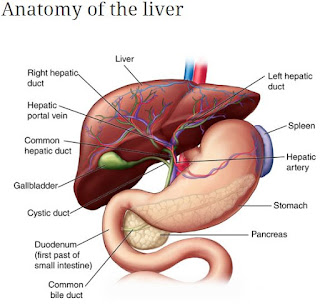What Does the Liver Do In The Digestive System
Anatomy of the liver
Liver Location In Human Body
The liver is located in the upper right-hand portion of the abdominal cavity, beneath the diaphragm, and on top of the stomach, right kidney, and intestines.
Shape Of The Liver
Shaped like a cone, the liver is a dark reddish-brown organ that weighs about 3 pounds.
2 distinct sources supply blood to the liver, including the following:
- Oxygenated blood flows in from the hepatic artery
- Nutrient-rich blood flows in from the hepatic portal vein
The liver holds about one pint (13%) of the body's blood supply at any given moment. The liver consists of 2 main lobes. Both are made up of 8 segments that consist of 1,000 lobules (small lobes). These lobules are connected to small ducts (tubes) that connect with larger ducts to form the common hepatic duct. The common hepatic duct transports the bile made by the liver cells to the gallbladder and duodenum (the first part of the small intestine) via the common bile duct.
Functions Of The Liver [What The Liver Does In The Digestive System]
- Liver manages cholesterol: Your liver makes a digestive juice called bile that helps digest fats and some vitamins. Bile ducts carry bile from your liver to your gallbladder for storage, or to the small intestine for use.
- It is our liver that ensures and regulates the assimilation of fats and proteins. Its proper functioning is important so as not to clog the arteries and to reduce cardiovascular risks.
- Production of bile, which helps carry away waste and break down fats in the small intestine during digestion
- Protects Us From Diabetes: The liver regulates the assimilation of sugars. Along with the pancreas, it maintains normal blood sugar levels. This protects you from diabetes as well as abnormal weight gain due to this kind of dysfunction.
- Production of cholesterol and special proteins to help carry fats through the body
- Clearing the blood of drugs and other poisonous substances
- Clearing the blood of drugs and other poisonous substances
- Regulating blood clotting
- Resisting infections by making immune factors and removing bacteria from the bloodstream
- Clearance of bilirubin, also from red blood cells. If there is an accumulation of bilirubin, the skin and eyes turn yellow.
- It is a reserve of essential nutrients, vitamins, iron, which it diffuses in the body when it needs it. All the muscles in the body will demand these nutrients to function well.
Other Important Functions Of the liver
- BALANCE BLOOD
- MUSCLE AND JOINT PROBLEMS
Diseases Of The Liver:
Signs Of a Damaged Liver
- Digestive problems: Your liver is a key part of your digestive system, responsible for cleaning out toxins from your blood, processing medicines, producing bile, helping you digest fat, storing glucose, and producing proteins for clotting your blood, among many other things. Other digestive problems might also include, heartburn, bloating, gas, nausea.
- Reddened palms (palmar erythema). Roughly a quarter of people with liver cirrhosis develop palmar erythema – a reddening of the skin on the palms.
- Skin irritation: acne, eczema, itching, allergies
- Fatigue and tiredness
- Dark urine. Urine that is dark orange, amber, cola-colored, or brown can be a sign of liver disease. The color is due to too much bilirubin building up because the liver isn’t breaking it down normally.
- Weight gain: overweight, love handles, cellulite
- Yellow skin or eyes (jaundice): Jaundice is due to the build-up of bilirubin (a bile pigment) in the blood because it can’t be processed effectively. The skin may also be itchy for the same reason.
- Muscle and joint problems: arthritis, rheumatism, night cramps
- Blood balance: diabetes, cholesterol
- Swollen abdomen (ascites). Ascites happen because fluid is retained in the abdomen. The legs and ankles may also become swollen due to fluid retention.
- Emotional and psychic balance: nervousness, nightmares, depression






















